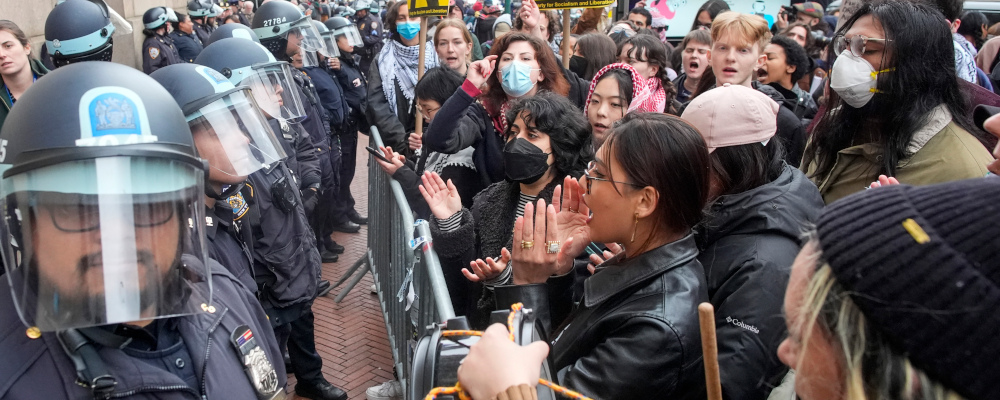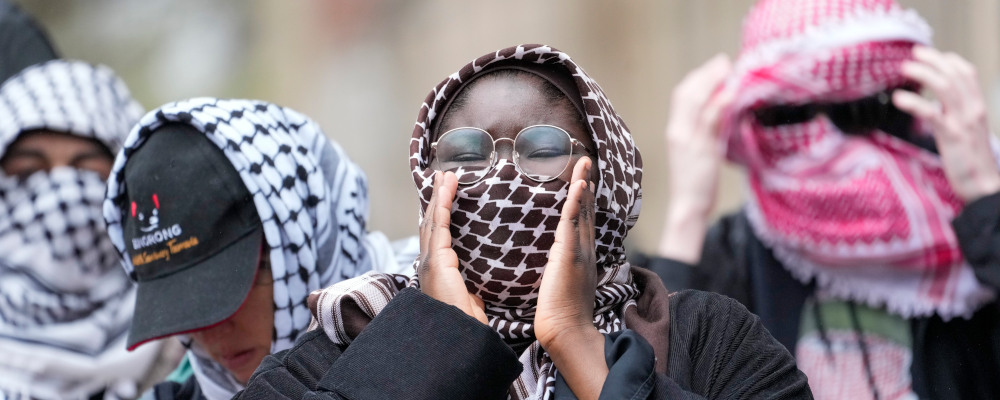Yesterday at Yale University, police officers arrested dozens of pro-Palestinian protesters who set up an encampment on school grounds, one of a growing number of organized demonstrations on college campuses across America. While the protests are ostensibly aimed at supporting Palestinian civilians amidst the ongoing Israel-Hamas war, there have been numerous reported instances of protesters engaging in the intimidation and harassment of Jewish students and faculty.
Similar developments were present on Parliament Hill in Ottawa over the weekend. Ottawa Police are reportedly investigating possible instances of hate speech, including chants in favour of the October 7 terrorist attacks in Israel.
The Hub spoke to Greg Lukianoff, president and CEO of the Foundation for Individual Rights and Expression (FIRE), a U.S.-based civil liberties group dedicated to defending free speech and individual rights. He spoke about the protests, how to determine when protected expression crosses the line into harassment, and the current state of free speech in academic institutions.

SEAN SPEER: What’s your reaction to the protests at Columbia University, Yale University, and elsewhere? And what is the balance here between supporting free speech and protecting Jewish students and faculty?
GREG LUKIANOFF: Since October 7th we’ve definitely seen a combination of clearly protected speech by pro-Palestinian students—speech that we’ve proudly defended because we are a nonpartisan organization; we will always defend people regardless of the content of their speech—but we’ve also seen an awful lot of assault, we’ve seen a lot of shout-downs, we’ve seen a lot of vandalism, and we’ve seen a lot of unprotected speech. It’s been accelerating for several months now.
Probably one of the worst places for this phenomenon has been Columbia University in New York City. What happened over the weekend, with the crackdown on the encampments that they had there, was interesting from a free speech standpoint, partially because you don’t have a First Amendment or free speech right to camp out on campus grounds. You have a protest right. But generally, every school in the country has rules that basically say, “No, you can’t camp here. You can’t turn this into your own encampment.” They just haven’t been enforcing them. So Columbia, to a degree, is paying the price for not actually fairly enforcing their rules, going far back.
Now, do I think that in the course of this, there are students engaged in protected speech who are getting in trouble? I have very little doubt that there are. And we want to know about those cases. But we’ve also seen, particularly at Columbia, examples of assault. Certainly examples of students being blocked and surrounded. Also, students engaging in things that, by pretty much any definition, would count as discriminatory harassment, which is a severe, persistent, and pervasive patterns of behaviour that a reasonable person would understand is discriminatory. And that’s something that we’ve seen, unfortunately, all over the country.
Now at Yale, we even know the student who was stabbed in the eye with a Palestinian flag, and she had to go to the hospital for it. That obviously isn’t protected. I think that there was a chance for a lot of these schools to prevent a lot of this from escalating by simply, fairly, and evenly enforcing their rules from the very beginning. But in a lot of cases, they simply didn’t.
One thing that readers really need to understand is that if you care about free speech on campus, you need to know that last year was the biggest year for deplatforming in recorded history, that we know of, on American college campuses. Deplatforming includes getting speakers disinvited and shout-downs. Yet this year, 2024, is going to blow 2023 out of the water, even just from shout-downs. And that has overwhelmingly come from pro-Palestinian students. Some of them have engaged in violence, including at Berkeley where they chased off an IDF speaker, for example, several weeks ago.
I sometimes see people arguing as if violence is just an extreme form of free speech. I always have to correct them like, “No, violence is the antithesis of what freedom of speech is for.” Freedom of speech is for the peaceful resolution of differences. Violence is completely the opposite and it should not be tolerated at all on college campuses. Students engaging in violence against their fellow students should be expelled. They deserve due process, but they should also be prosecuted because this is this has been getting out of hand for months now.

SEAN SPEER: Is there a free speech line to be drawn between anti-Zionism and antisemitism? And how can such a line be discerned?
GREG LUKIANOFF: I don’t think you have to really draw a line between anti-Zionism and antisemitism. What you have to ask yourself is, is it discriminatory harassment? Is it a threat? Regardless of what line that falls under. So if you’re surrounding students and threatening them, for example, then it doesn’t matter if you’re calling out Israel or calling out Jews, it’s not protected. And nor should it be.
I think that’s one of the things that American law really gets right. It’s something that we call “the bedrock principle” in the United States, which is you can’t ban speech simply because it’s offensive. But you can ban patterns of behaviour that are discriminatory, for example, or you can ban speech that actually would place a reasonable person in fear of bodily harm or death. So we try to get out of evaluating the offensiveness of the expression and into a reasonable understanding of the behaviour. This is a way to not have to make judgments on whether or not we think one kind of speech is more offensive than the other, which of course, is always a culturally laden evaluation to make. That is difficult in a genuinely multicultural society.
SEAN SPEER: Do you think universities that have permitted these instances of intimidation and violence will face consequences in terms of enrollment, donations, and so on? If so, is there room for a market correction of sorts?
GREG LUKIANOFF: I definitely think students are going to be afraid to apply to places like Columbia, in particular—and particularly Jewish students, but not just Jewish students—because of all of the bad examples they’re seeing there. We already know that Harvard applications are down so far this year as well. There are a lot of donors have been saying that they won’t donate to these schools until they do something. So I think that there is potential for some amount of a market correction. But I think that thinking this will be an easy or fast fix underestimates how bad it’s gotten for such a long time.
SEAN SPEER: We’re speaking about a combination of private colleges as well as what you in the United States call “state schools” or public universities or colleges. In either case, what, if any ,role is there for government, in your mind, to address these issues?
GREG LUKIANOFF: In terms of what state schools can do, actually, the government is required to be involved to protect freedom of speech on campus because the First Amendment applies to students’ free speech as well as professors’ free speech. I think they’ve been kind of falling down on the job on this. I think that universities that had speech codes that were unconstitutional, that’s something that the government never should have tolerated in the first place. I think when there are violent shout-downs, that’s something that the government should not be tolerating. I think that the government has really dropped the ball, in a lot of cases, on defending free speech on campus for decades now, and actually, in many cases, have passed regulations that made the issue worse.
SEAN SPEER: Your latest book, The Canceling of the American Mind, sets out a series of institutional and policy reforms to push back against some of the ideological trends on campus that we’ve seen over the past several months and tries to cultivate a free speech culture. In light of some of the developments over the weekend, are there any particular recommendations that you think are especially resonant for the moment?
GREG LUKIANOFF: Well, the very first thing we recommend in the section on higher education is to have a lot fewer jobs in the United States that require a bachelor’s degree. We’ve created an incredibly expensive system. I mean, I know someone who is just realizing that it is probably going to cost their kid $95,000 a year to go to one of these schools. This has been putting Americans in huge debt. We need to really rethink how we do a lot of these things. We need cheaper, more rigorous alternatives to our very strange, and in some cases, very illiberal higher education system in the first place. I think that some of the experiments that are going on at places like the University of Austin give me some hope.
But I think we should be thinking big in terms of the kind of reforms we need. Because even if it was just on bureaucratization and cost alone, American higher education would need major reform. As we were seeing all over the country, particularly in elite colleges, there’s a lot more going on than even just that.




